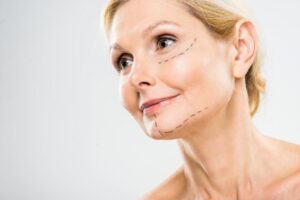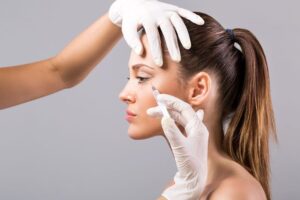In the vibrant and ever-evolving world of beauty and skincare, a new star is rising on the horizon of aesthetic treatments: polynucleotide therapy. This breakthrough therapy taps into the body’s natural processes, offering a holistic approach to enhancing not only the outer appearance but also the intrinsic health of our skin. As we explore the depths of this remarkable treatment, we’ll uncover how the very code of life is being used to rewrite the rules of aesthetic medicine.
Understanding Polynucleotides
Polynucleotides, often abbreviated as PNs, are long chains of nucleotides, the foundations of DNA and RNA. These molecules are key in genetic encoding and various biological processes. Sourced from natural origins like salmon or trout DNA, these polynucleotides undergo an intense purification process, ensuring their safety for medical use.
Though we’ll cover all the major benefits in a moment, it’s important to note that polynucleotides have gained significant prominence for their role in skin rejuvenation, notably by stimulating the production of collagen, elastin, and hyaluronic acid. These all contribute to firmer, plumper skin and reduce visible lines and wrinkles. Additionally, they aid in minimising scars, including acne, surgical, and traumatic scars, by accelerating wound healing and promoting healthier collagen production. Their ability to improve skin hydration further enhances overall skin radiance, creating a natural, healthy glow.
Clinical Evidence & Studies
There’s also a growing body of clinical evidence surrounding polynucleotide therapy in aesthetics. Early studies focusing on this innovative treatment have shown remarkable results in reducing wrinkles and improving overall skin quality. The mechanism of action for polynucleotides involves a deep interaction with skin cell receptors. This interaction triggers a series of cellular processes that lead to the regeneration of skin tissue and the enhanced production of collagen and elastin fibres. These proteins are crucial for maintaining the skin’s elasticity and firmness, making their increased production key to the visible reduction of ageing signs.
Dr. Verma emphasises the significance of these findings. “Research into polynucleotides marks a big moment in skin rejuvenation therapies. By directly targeting the ageing process at the cellular level, we’re seeing a shift towards more effective and non-invasive approaches to skincare,” she states.
Comparison with Other Treatments
Compared to traditional treatments in aesthetic medicine, such as hyaluronic acid (HA) fillers, polynucleotide therapy stands out for its unique approach and results. HA fillers have typically been the go-to for adding volume and contouring the face, filling wrinkles and plumping the skin. However, their action is mostly superficial, addressing only the outward symptoms of ageing rather than the underlying causes.
Polynucleotide therapy, on the other hand, rejuvenates the skin at the cellular level. A notable study in the field highlighted the long-term differences in skin elasticity and hydration when comparing these two treatments. The study found that while both treatments initially improved skin appearance, polynucleotide therapy led to more sustainable improvements in skin health over time. This included enhanced skin elasticity and better hydration levels, essential for maintaining youthful skin.
Flavio Refregeri, the visionary behind Fiore Aesthetics, backs this up by saying, “Polynucleotide therapy represents such a big shift in aesthetic medicine. Unlike the traditional treatments that offer more temporary fixes, this therapy rejuvenates the skin at a foundational level, providing lasting and more profound results. It’s really not just about looking younger; it’s about giving our clients healthier skin from within.”
This difference between traditional treatments and this is primarily due to the regenerative nature of polynucleotides, which work to restore the skin’s natural functions and structures, as opposed to simply filling in the gaps caused by ageing. As a result, patients undergoing polynucleotide therapy often experience more holistic and lasting improvements in their skin’s health and appearance.
The Benefits of Polynucleotide Therapy
Polynucleotide therapy offers many benefits that extend far beyond traditional skin rejuvenation techniques. This therapy’s advantages cover a broad range of skin concerns, establishing it as arguably the most versatile and highly effective treatment option on the market. Let’s take a look at some of the key benefits:
1. Enhanced Collagen and Elastin Production
The main benefit of polynucleotide therapy is its ability to stimulate the natural production of collagen and elastin in the skin. These proteins are crucial for maintaining the skin’s structural integrity and elasticity. As we age, the production of these proteins diminishes, leading to the development of wrinkles and sagging skin. Polynucleotide therapy counters this natural ageing process by promoting the skin’s ability to regenerate these vital proteins, restoring firmness and reducing the appearance of ageing signs.
2. Comprehensive Scar Treatment
Polynucleotides have shown remarkable effectiveness in scar treatment. They accelerate the skin’s healing process, making them highly effective for reducing the appearance of various types of scars, including those from acne, surgeries, or injuries. By stimulating skin cell regeneration and promoting the formation of healthy new tissue, polynucleotide therapy helps minimise scar visibility, resulting in smoother and more uniform skin.
3. Improved Skin Hydration and Texture
Another significant advantage of polynucleotide therapy is its ability to enhance skin hydration. Increasing the skin’s capacity to retain moisture combats dryness and gives the skin a plumper, more radiant appearance. Additionally, the therapy refines the skin texture, smoothing out irregularities and promoting a more even, smooth complexion. This leads to visibly rejuvenated skin that not only looks healthier but also feels softer and more supple.
4. Anti-Inflammatory Properties
Polynucleotide therapy is also celebrated for its anti-inflammatory benefits. It is particularly beneficial for individuals with sensitive or reactive skin types, including conditions like rosacea or skin sensitivities following other aesthetic treatments. The therapy helps calm skin inflammation, reduce redness, and provide a soothing effect essential for maintaining skin health and comfort.
6. Complementing Other Aesthetic Treatments
Polynucleotide therapy can also be effectively combined with other aesthetic treatments, such as microneedling or laser therapies, to enhance overall results. This synergy allows for a more comprehensive approach to skincare, addressing various concerns in a cohesive treatment plan.
7. Long-Term Skin Health Benefits
Last but certainly not least, polynucleotide therapy significantly contributes to long-term skin health. Enhancing the skin’s natural repair mechanisms and promoting cellular health ensures sustained benefits, keeping the skin vibrant and youthful over a more extended period.
In Summary
Polynucleotide therapy is a versatile and practical solution in modern aesthetics. Its wide-ranging benefits and a strong safety profile make it a perfect choice for those of us searching for comprehensive skincare solutions. As we continue to witness its impact, polynucleotide therapy will continue redefining aesthetic care and beauty standards.











